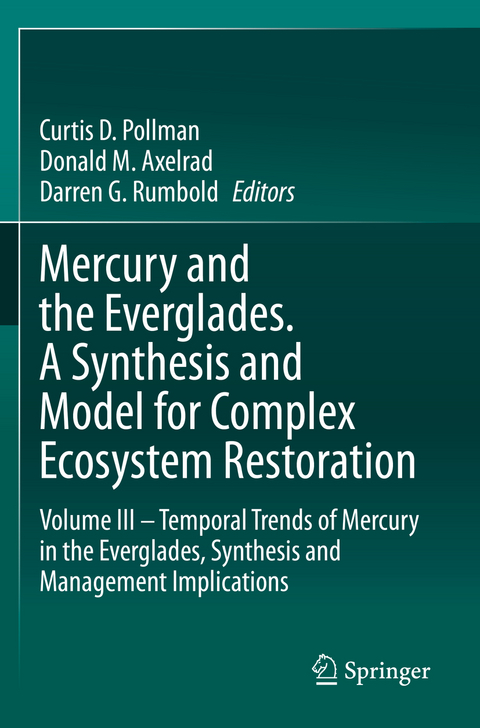
Mercury and the Everglades. A Synthesis and Model for Complex Ecosystem Restoration
Springer International Publishing (Verlag)
978-3-030-55637-2 (ISBN)
This book is the final installation in a three-volume series synthesizing 30 years of mercury research in the Florida Everglades. The first part of this book evaluates the occurrence of trends in both biota mercury concentrations and atmospheric mercury deposition. Through both empirical and deterministic analyses, the likely drivers of biota trends are identified. These analyses help lay the predicate for devising an overall strategy to mitigate and manage the Everglades mercury problem. The book concludes with a model analysis of the likely benefits and uncertainty attendant with implementing the leading candidate strategy for best reducing the Everglades mercury problem.
lt;b>Curtis D. Pollman is currently the CEO of Aqua Lux Lucis, Inc. and adjunct research professor in the Department of Geological Sciences at the University of Florida. He also holds a position as Chief Science Officer for Nclear, Inc., which is a start-up venture seeking to commercialize the applications of a novel synthetic calcium silicate mineral for removing phosphorus from water and wastewater. He obtained his Ph.D. in environmental engineering sciences from the University of Florida in 1983 where he specialized in aquatic chemistry and limnology. Dr. Pollman has been involved in various research projects relating to mercury (Hg) cycling in the environment, including the Everglades, since 1994. This research spanned his tenure with Tetra Tech's Research & Development Division between 1995 and 2006, where he both led the Florida Atmospheric Mercury Study (FAMS) and participated in modifications to the Mercury Cycling Model (MCM) and its subsequent application to the Florida Everglades. Between 2005 and 2007, he served as the CEO and Chief Scientist for Frontier Geosciences, Inc. (FGS), a small, highly specialized laboratory that was then widely acknowledged as one of the pre-eminent commercial laboratories worldwide engaged in the analysis of Hg and other trace elements at ambient concentrations in natural waters. Dr. Pollman left Frontier Geosciences in late 2007 to form Aqua Lux Lucis with the express goal of conducting applied research and analysis to help inform decision makers devise environmental policy and strategies with a more robust understanding of the likely outcomes and inherent uncertainties. This work includes using deterministic and statistical models to elucidate processes governing response variable dynamics in complex systems and using these models as tools to place in context and help resolve complex environmental problems.
Donald M. Axelrad, Ph.D. is an Associate Professor of Environmental Health in the Institute of Public Health, College of Pharmacy, at Florida A&M University (FAMU). He earned a B.S. degree in Chemistry from Wayne State University, an M.S. in Environmental & Industrial Health from the University of Michigan, and a Ph.D. in Marine Science from the College of William and Mary. Prior to joining FAMU, from 1996-2013 while with the Florida Department of Environmental Protection, Dr. Axelrad had responsibilities for writing and editing the annual 'Mercury and Sulfur Environmental Assessment' chapter of the 'South Florida Environmental Report' (SFER). This peer-reviewed publication - mandated by Florida's (1994) Everglades Forever Act - is issued annually and summarizes "all data and findings of the State's mercury monitoring and research in South Florida".The SFER chapter concerns the magnitude and extent of the Everglades mercury problem, mercury sources to the Everglades, mercury biogeochemistry, bioaccumulation, human and wildlife toxicology, and options for mitigating the mercury problem. At FAMU, Dr. Axelrad teaches Environmental Health and Environmental Toxicology, remains involved in research on mercury exposure to women of childbearing age, as well as on lead exposure in children.
Darren Rumbold is a Professor of Marine Science and Director of the Coastal Watershed Institute at Florida Gulf Coast University (FGCU). He earned a BA in Chemistry and a BS and MS in Biology from Florida Atlantic University. He completed his Ph.D. in the Department of Marine Biology and Fisheries at University of Miami's Rosenstiel School of Marine and Atmospheric Science in 1996. In 1997, he was awarded a U.S. EPA Environmental Science & Engineering Fellowship at the National Center for Environmental Assessment in Washington, DC. From 1998-2006, he served as Senior- and, later, Lead Scientist with South Florida Water Management District (SFWMD) overse
- Trends in Atmospheric Deposition of Mercury. - Temporal Changes in Mercury Concentrations in Everglades Biota. - Legacy Mercury. - Simulating Mercury Cycling in the Florida Everglades: A Case Study. - Temporal Changes in the Mercury Signal in the Everglades: A Synthesis. - Structural Equation Model for Mercury Cycling in the Everglades. - Mercury Mitigation Management Strategies and Likely Outcomes.
"The editors and authors of this set of books have done a real service to Everglades management, to environmental science, and particularly to those who deal with risks from Hg." (Glenn Suter, Integrated Environmental Assessment and Management, Vol. 17 (3), 2021)
| Erscheinungsdatum | 02.12.2021 |
|---|---|
| Zusatzinfo | XV, 164 p. 78 illus., 72 illus. in color. |
| Verlagsort | Cham |
| Sprache | englisch |
| Maße | 155 x 235 mm |
| Gewicht | 285 g |
| Themenwelt | Naturwissenschaften ► Biologie ► Ökologie / Naturschutz |
| Naturwissenschaften ► Geowissenschaften ► Hydrologie / Ozeanografie | |
| Schlagworte | Ecosystem Restoration • Everglades • Hg Cycling • Hydrology • Mercury |
| ISBN-10 | 3-030-55637-9 / 3030556379 |
| ISBN-13 | 978-3-030-55637-2 / 9783030556372 |
| Zustand | Neuware |
| Haben Sie eine Frage zum Produkt? |
aus dem Bereich


